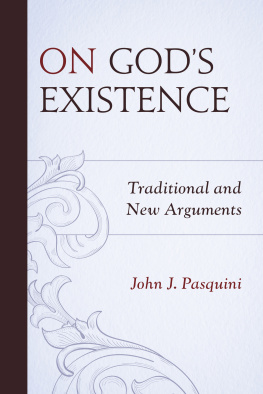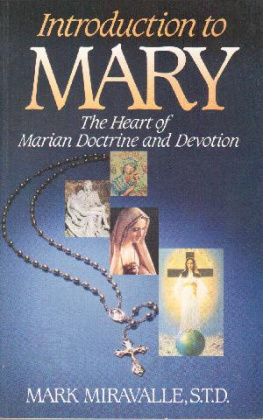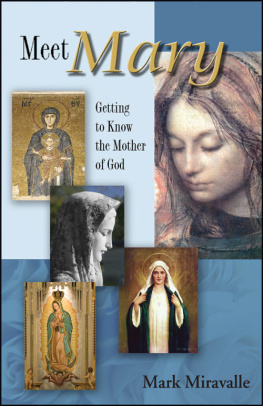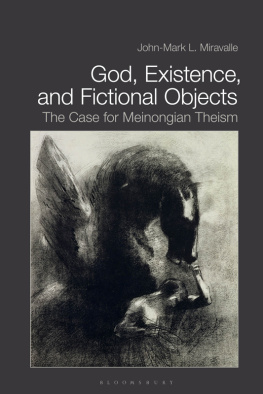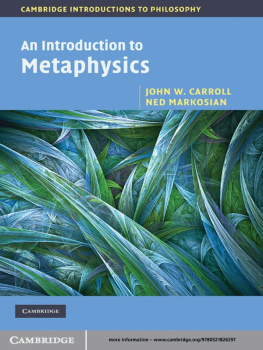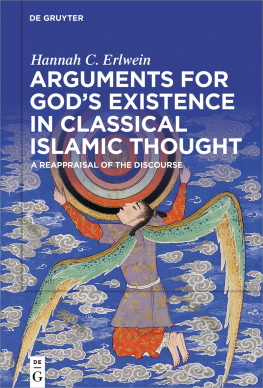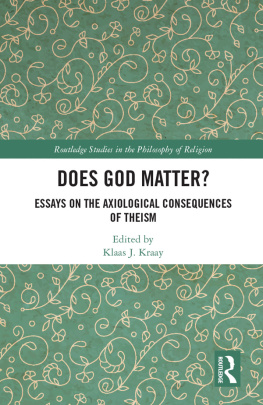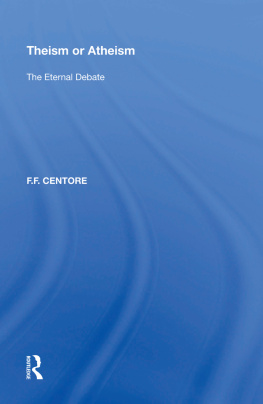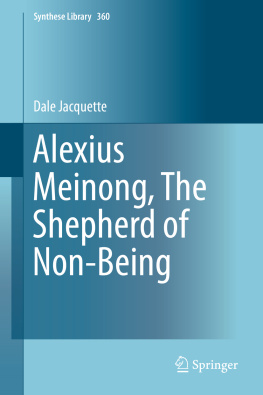God, Existence, and Fictional Objects
Also available from Bloomsbury
Advances in Religion, Cognitive Science, and Experimental Philosophy, edited by Helen de Cruz and Ryan Nichols
Evidentialism and the Will to Believe, by Scott F. Aikin
Free Will and Epistemology, by Robert Lockie
God, Existence, and Fictional Objects
The Case for Meinongian Theism
John-Mark L. Miravalle

Let me begin by thanking Colleen Coalter and Helen Saunders at Bloomsbury, and the anonymous reviewers for their comments.
Id also like to thank Michael Hahn and Fr. Sebastian Walshe for being willing to talk through thomistic issues generally over the years and specifically Aquinass take on fictional objects.
My Mount St. Marys colleagues Josh Hochschild and Thane Naberhaus were very generous with their time in reading over this manuscript and giving helpful feedback. Thanks to both of you.
Thanks especially to Tikhon Pino for reading the manuscript, and for being willing to talk through basically any random thing for the past decade or so. Theres probably not an idea in my head that hasnt been enriched by our hours of conversation. So thanks again.
My kids didnt directly contribute to this book, but I couldnt leave them out. So, thanks to Pius, Cassian, Stella, Caeli, and Roman. Im so glad you all exist.
Jessica, my wife, has been unwaveringly supportive and patient as Ive explored this topic over the last several years. Shes also donated a lot of time and effort to looking over my writing, even though, as she said early on, I hate reading about meinongianism. Thank you, Jessica, for everything.
Finally, my thanks to my parents, Mark and Beth Miravalle, who gave of themselves so extravagantly in teaching me everything they possibly could. This book is dedicated to both of you.
For classical theism, the fundamental relationship between God and finite things is creation. God making creatures, causing them to exist, is priorboth chronologically and metaphysicallyto any revelation or redemption or sanctification. God brings things into existence: traditional theistic doctrine asserts that if God hadnt made us we wouldnt have existed, and if God so chose he could let us fall back into nonexistence by removing his sustaining power.
Accordingly, as contingent beings we stand between two poles: God, the necessary existent, on the one side, and the nonexistence that is our native, default state on the other side. Yet although theologians occupy themselves a great deal with reflection on what it means to bewhat it means for us to exist and for God to existthey do not generally display the same interest in the nonexistence from which we have emerged. We acknowledge our humble origins in passing but rarely, if ever in theological writing, is there a sustained analysis on what it means not to exist. And yet celebrating our existence is a pretty hollow formality unless we can starkly contrast our good fortune as creatures with the very different fate of not existing. No one will be grateful for her large inheritance unless she is made to understand clearly what it means to be poor. So too, there is no way to appreciate the fundamental relationship between God and creatures unless we understand clearly what it means for something to be not real.
Fortunately, the philosophical discussion regarding what it means not to exist has been carried on with admirable zest by the analytic tradition throughout the last century and into this one. The resources are available, consequently, for a thematic treatment of the role a rigorous account of nonexistence could play in metaphysical theism.
Among the competing accounts of nonexistence, I believe meinongianism to be of special interest to theology for at least two reasons. First, because no one has yet offered an extensive argument for a meinongian-theist merger, and so such an argument should elicit some interest from its originality alone. Second, because so many of the uncritical formulations of traditional theistic belief seem to imply meinongian presuppositions. Consider, for instance:
You should thank God for your very existence.
Gods so powerful, he was able to create you out of nothing.
God knew all about you before you even existed.
Only God has to exist, the rest of us only exist because he wanted us to.
The apparent meinongian implications become evident without much reflection: If I owe my existence to God, does that imply that I might have been a nonexistent if God had otherwise chosen? If God knew about me before I existed, does that imply that nonexistents can be known? If creation is good, does that imply that nonexistence is not as good? If God necessarily exists, and we dont, does that imply that existence is a property that can be possessed essentially (as in Gods case) or nonessentially (as in the case of creatures)?
I think the answer to all these questions is Yes, and I think too that simple meinongianism (the position that some things dont exist even though they have identifiable properties) is the theory of nonexistence that best accommodates the metaphysical implications of traditional theism.
Happily, I also believe that meinongianism is a compelling account of nonexistence on its own merits, and that it better reflects the relevant phenomena of experience and linguistic practice than the other available theoretical options. I have consequently devoted Part One of this book to a survey of the primary models employed by philosophers when engaging the issue of fictional objects (which I will use instead of nonexistents during the first part to avoid tendentious terminology). The first chapter looks at fictional object nominalism, which holds that fictional objects dont exist at all, have no character, and that speech which seems to be about them is really obliquely about something else. The second chapter deals with various forms of fictional object realism, the group of theories that identify fictional objects as genuinely existing, although in certain unfamiliar or unintuitive ways. Finally, the third chapter introduces and argues for a simple form of meinongianism, and attempts to ease certain strong intuitions against the idea that a thing could be known or have properties when it doesnt even exist.
Part Two transitions into issues directly related to theism by looking at how meinongianism can buttress the cosmological and ontological arguments for Gods existence, which will be the topics of , respectively. I argue that the cosmological argument cant ultimately get off the ground without meinongianism, since on any other model the question Why does that exist? requires no causal response. As to the ontological argument, I concur with a great deal of the scholarship in thinking that its soundness stands or falls with meinongian principles, although I will make the uncommon argument that they both stand together.
Part Three looks at the nature of creation beginning with a reflection on the doctrine of creation ex nihilo in examines the relationship between divine existence and creaturely existence, and closes by providing a comparison and contrast between the infinite existence of God and the vast realm of nonexistents.
Part Four deals with questions of divine providence and free will. looks at the privation account of evil, particularly with regard to the evil of personal sin. Privation as a whole is a fitting topic for meinongian reflection, and I think it is easier to understand the personal resistance to Gods grace by individual creatures when we think of them as having a complete personal character in their nonexisting state.
This isnt a long book, but as can be seen from the foregoing, I have opted to address a good number of nuanced and sometimes highly controversial issues. Why such an ambitious range of topics? Because the goal of the book is to show the different areas in which adoption of meinongian principles might be advantageous to philosophical theism. This is a first volume on the subject, and one of its chief objectives is to suggest various directions in which the idea of meinongian theism might be developed. There is consequently a survey aspect to the project, and exhibiting the richness of the concept is in some ways more important than convincing every reader of the soundness of every argumentwhich never happens anyway. Consequently, it would be, I think, missing an opportunity to shy away from areas of high interest simply because they also happen to be areas of high controversy.
Next page


